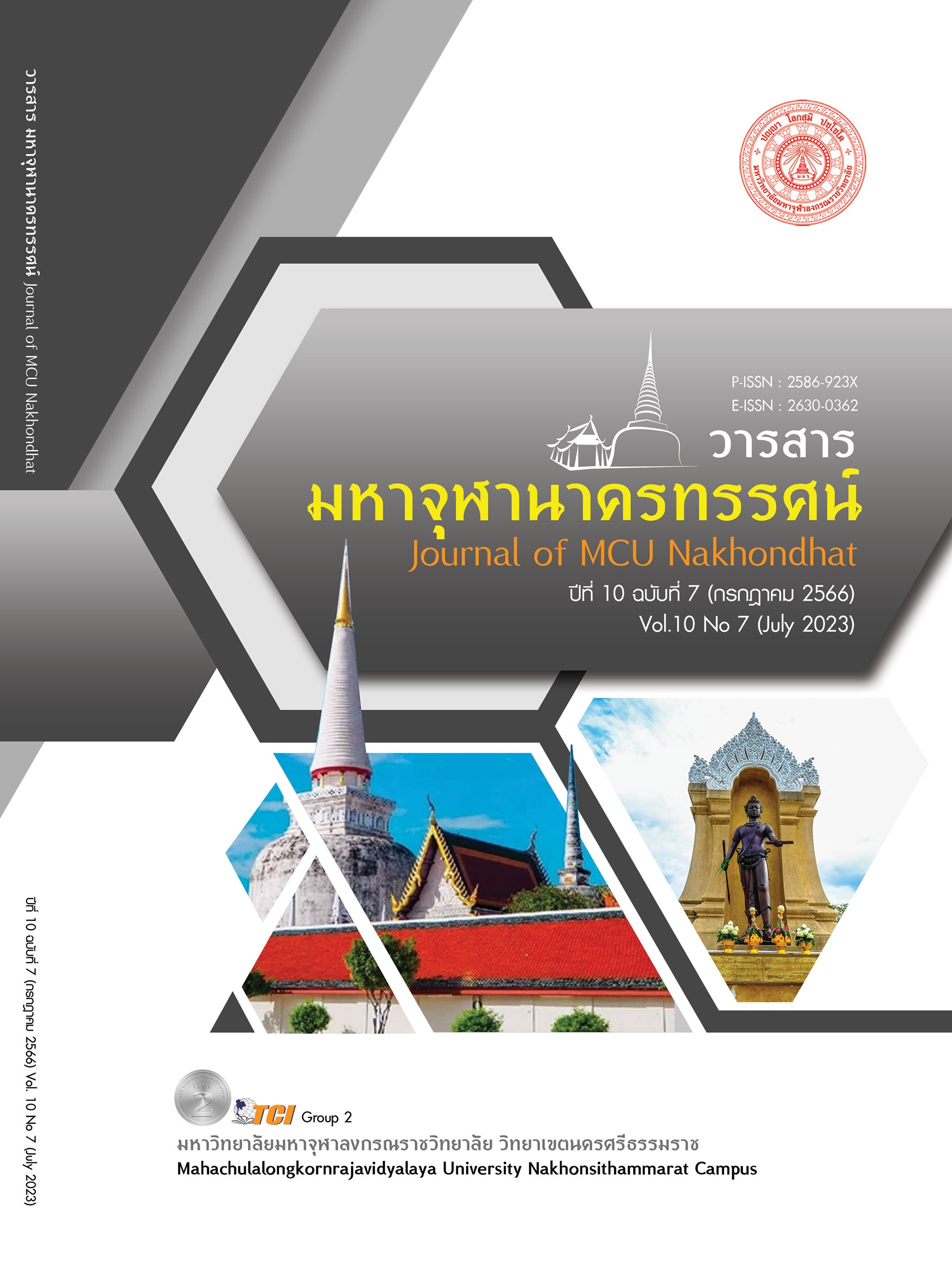SPIRITUAL AND IDEOLOGICAL LEADERSHIP OF SCHOOL ADMINISRATORS AFFECTING EFFECTIVENESS IN THE NEXT NORMAL IN SCHOOLS UNDER THE SECONDARY EDUCATIONAL SERVICE AREA OFFICE SAKAEO
Main Article Content
Abstract
This research article aimed to: 1) the spiritual and ideological leadership of school administrators, 2) the schools’ effectiveness in the next normal, 3) study the relationship between the spiritual and ideological leadership of school administrators, and the schools’ effectiveness in the next normal, and 4) create a forecast for the spiritual and ideological leadership of school administrators affecting the schools’ effectiveness in the next normal under the Secondary Educational Service Area Office Sakaeo. It is quantitative research. The sample group of this research was 260 teachers under the Secondary Educational Service Area Office Sakaeo in academic year 2022, and was determined by Krejcie and Morgan Table. The instrument for data collection was done by five rating scale questionnaires that had reliability 0.90. The statistics was used by Percentage, Average, Standard Deviation, Person Correlation Coefficient, and a Multiple Regression analysis. The results found that: 1) the spiritual and ideological leadership of school administrators is at the high level 2) the schools’ effectiveness in the next normal is at the high level 3) the spiritual and ideological leadership of school administrators has the positive relationship at moderate level with the schools’ effectiveness in the next normal with the statistical significance at the 0.01 and 0.05 level and 4) the spiritual and ideological leadership of school administrators affects the schools’ effectiveness in the next normal, and is able to forecast the schools’ effectiveness by 28.30 percent with the statistical significance at the 0.05. It was able to forecast equation in raw score form was = 2.155 + 0.138 (X2) + 0.367 (X3) , and the forecast equation in the standard score form was y = 0.157 (X2) + 0.433 (X3)
Article Details

This work is licensed under a Creative Commons Attribution-NonCommercial-NoDerivatives 4.0 International License.
References
จรูญ หยูทอง. (2561). ทำไมการศึกษาของไทยจึงล้มเหลว? เรียกใช้เมื่อ 16 มกราคม 2566 จาก https://www.hagronline.com/south/detail/9610000009414
ชวิน ศิลาพันธ์ และรัตติกรณ์ จงวิศาล. (2564). อิทธิพลของทุนจิตวิทยาภาวะผู้นำที่แท้จริง และจิตวิทยาในสถานที่ทำงานที่มีต่อความร่วมมือของข้าราชการกรมราชทัณฑ์ในเรือนจำพิเศษในกรุงเทพมหานคร. วารสารมนุษยศาสตร์, 22(2), 95-114.
ณัฐศิษฏ์ จิตร์จำนงค์ และคณะ. (2566). ภาวะผู้นำเชิงกลยุทธ์ของผู้บริหารสถานศึกษาที่ส่งผลต่อประสิทธิผลของสถานศึกษา สังกัดสำนักงานเขตพื้นที่การศึกษาประถมศึกษาสุราษฎร์ธานี เขต 2. วารสารรัชต์ภาคย์, 17(50), 361-375.
ตวงทิพย์ ขุนโนนเขา และคณะ. (2562). ภาวะผู้นำเชิงจิตวิญญาณและอุดมการณ์ของผู้บริหารมหาวิทยาลัยราชภัฏในภาคตะวันออกเฉียงเหนือ:การวิจัยแบบผสมผสานวิธี. วารสารมนุษยศาสตร์และสังคมศาสตร์มหาวิทยานครพนม, 9(2), 68-76.
ธนาภัสสร์ สนธิรักษ์ และคณะ. (2565). มิติรูปแบบการเรียนการสอนภาษาอังกฤษในยุควิถีชีวิตใหม่. วารสารมหาวิทยาลัยมหาจุฬาลงกรณราชวิทยาลัยมนุษศาสตร์ปริทรรศน์, 8(1), 413-432.
ธมลวรรณ มีเหมย และคณะ. (2554). ภาวะผู้นำแบบผู้รับใช้จิตวิญญาณในองค์การที่ส่งผลต่อผลการปฏิบัติงานของผู้บริหารระดับต้นธุรกิจอุตสาหกรรมแห่งหนึ่งในเขตกรุงเทพมหานคร. วารสารพระจอมเกล้าพระนครเหนือ, 2(2), 447-455.
นพรินทร์ สุบินรัตน์ และพิมพ์อร สดเอี่ยม. (2561). ความสัมพันธ์ระหว่างภาวะผู้นำเชิงวิสัยทัศน์ของผู้บริหารสถานศึกษากับประสิทธิผลของโรงเรียน สังกัดสำนักงานเขตพื้นที่การศึกษามัธยมศึกษา เขต 19. วารสารอินทนิลทักษิณสาร, 13(ฉบับพิเศษ), 67-81.
พระครูวิบูล สรกิจ. (2565). การบริหารกิจการคณะสงฆ์ในยุควิถีชีวิตใหม่. วารสารพุทธอาเซียนศึกษา, 7(1), 75-91.
พลวัต แสงสีงาม. (2564). แนวทางการพัฒนาภาวะผู้นำเชิงจิตวิญญาณของผู้บริหารโรงเรียนในเขตพื้นที่การศึกษาประถมศึกษาบุรีรัมย์ เขต 3. วารสารวิชาการและวิจัยมหาวิทยาลัยภาคตะวันออกเฉียงเหนือ, 11(1), 1-14.
ภูริกานต์ วัจน์ประภาศักดิ์ และรั่ตติกรณ์ จงวิศาล. (2557). ภาวะผู้นำเชิงจิตวิญญาณ บุคลิกภาพห้าองค์ประกอบ วัฒนธรรมองค์การ และผลการปฏิบัติงาน พนักงานระดับบังคับบัญชาบริษัทอุตสาหกรรมกระดาษแห่งหนึ่งในจังหวัดกาญจนบุรี. วารสารสังคมศาสตร์และมนุษยศาสตร์, 40(2), 92-107.
มูลนิธิคีนันแห่งเอเชีย. (2564). การแพร่ระบาดของโควิด-19 สร้างผลกระทบต่อการศึกษาไทยที่สำคัญ 3 ประการ. เรียกใช้เมื่อ 15 กันยายน 2564 จาก https://www.kenan- asia.org/th/covid19-education
เยาวเรศ บัวขาว และคณะ. (2560). ประสิทธิผลการบริหารงานของผู้บริหารในสถานศึกษา สังกัดสำนักงานเขตพื้นที่การศึกษาประถมศึกษานครศรีธรรมราช เขต 3. วารสารนาคบุตรปริทรรศน์, 2(1), 167-178.
สำนักงานเขตพื้นที่การศึกษามัธยมศึกษาสระแก้ว. (2565). แผนปฏิบัติราชการประจำปีงบประมาณ 2565. สระแก้ว: สำนักงานเขตพื้นที่การศึกษามัธยมศึกษาสระแก้ว.
สำนักงานเลขาธิการสภาการศึกษา. (2561). มาตรฐานการศึกษาแห่งชาติ พ.ศ.2561. กรุงเทพมหานคร: บริษัท 21 เซ็นจูรี่จำกัด.
สุวิมล มธุรส. (2564). การจัดการศึกษาในระบบออนไลน์ New normal covid-19. วารสารรัชตภาคย์, 15(40), 33-42.
เสรี ภักดี และคณะ. (2565). ศึกษากระบวนการบริหารของผู้บริหารสถานศึกษากับประสิทธิผลของสถานศึกษาสังกัดอาชีวศึกษา จังหวัดยะลา. วารสารมหาวิทยาลัยนราธิวาสราชนครินทร์ สาขามนุษยศาสตร์และสังคมศาสตร์, 9(2), 95-111.
Bafadal, I. et al. (2018). The Influence of Instructional Leadership, Change Leadership, and Spiritual leadership Appiled at Schools to Teacher Performance Quality. In International Conference on Educational and Technology (ICET 2018) Department of Educational Administration. State University of Malang, Malaysia.
Cronbach, L. J. (1990). Essentials of Psychological Testing. (5th ed). New York: Harper.
Krejcie, R. V. & Morgan, D. W. (1970). Determining Sample Size for Research Activities. Educational and Psychological Measurement, 30(3), 607-610.
Likert, R. (1993). A Technique for the Measurement of Attitude. Chicago: Rand Mc Nally.


